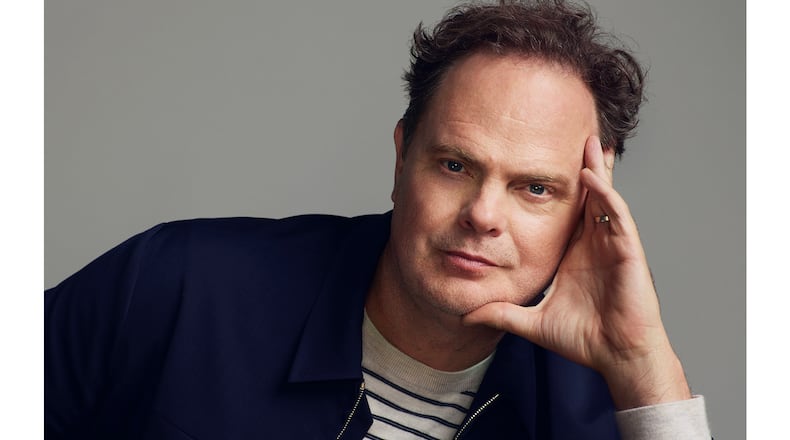Dwight Schrute, Rainn Wilson’s iconic character on “The Office,” lived life with a level of certainty regarding beets, idiots and his love for Angela. There are numerous memes and articles online quoting Schrute and celebrating the “Tao of Dwight.”
Wilson himself is far more nuanced, a man who has grappled with anxiety, depression, addiction and at certain points, a crisis in faith.
Now 57, he has seen what is happening in the world and decided to create his own manifesto of sorts: “Soul Boom: Why We Need a Spiritual Revolution.” The book, out April 25, is accompanied by a tour in which Wilson will discuss life’s big issues at the Rialto Center for the Arts in downtown Atlanta on Friday, April 28 as part of the Atlanta Film Festival. (Tickets are available for $37 at events.rialtocenter.gsu.edu and includes a signed copy of the book.)
“The death of my father right after COVID set in made me think about a lot of life’s biggest questions,” Wilson said in an interview with The Atlanta Journal-Constitution. “Thinking about death got me thinking about life on a larger level.”
Credit: Hachette Books
Credit: Hachette Books
He also visits college campuses to talk to students about the mental health epidemic and share his own issues: “The deeper I dig into it, the more I realize that there are some spiritual underpinnings that could really help people and are really important and potentially save lives.”
Wilson admits upfront in the book that he is no authority on spirituality and religion, but he said certain questions “don’t really get asked enough in contemporary culture like what is the meaning of life? We’re losing out by not digging into these questions. I don’t come with answers. I only come with questions, some ideas and some prompts for inspiring a back and forth. Also, the world is falling apart. So there’s that.”
He addresses suffering in his book and why humans deal with so much pain and agony. “So much of Buddha’s existing writings dealt with suffering,” he said. “That again is a giant human question we don’t talk much about but it could help us. People talk to young people about resilience. But resilience can be helped by understanding suffering and why we suffer and accepting that suffering is part of being alive. If you live and think you should not have hardship and struggle and should not be forced to overcome through struggle, you’ll be let down a lot.”
Credit: Rich Addicks/raddicks@ajc.com
Credit: Rich Addicks/raddicks@ajc.com
The book isn’t specifically about religion. Sure, he creates a mock religion for fun in a chapter, taking the best of what he sees as commonality among all religions such as prayer, love and compassion and throwing in a few of his own such as a connection to the natural world, cooperation between science and faith and an emphasis on music and arts.
“I’m encouraging people to explore spiritual ideas,” he said, “not join any specific religion.” He dubs his new religion a “jamabalya. Wanna join?”
Back in his 20s, Wilson said he had turned away from spirituality in all its forms but was suffering from multiple mental health afflictions, feeling anxious, overwhelmed and alienated. “Even though my dream of becoming an actor was coming true,” he said, “I was not happy. Perhaps I lost something jettisoning God and spirituality and religion. That led me on a spiritual quest to look for the truth and explore these all-important issues.”
He has spent the past two-plus decades reading all the important holy texts of various religions and related books: “I still read a lot now although my reading now runs a little in the positive psychology vein. But I still turn to mystical texts and get a lot out of them.”
He even returned to his childhood religion the Baha’i Faith, a religion that teaches the essential worth of all religions and the unity of all people. Wilson is even familiar with the Atlanta Baha’i Center near the Martin Luther King Center.
“For me personally, it works for being part of a faith community and a shared sense of ethos and transcendence and service together,” Wilson said. “But you don’t need to be part of any organized religion.”
People shy away from mainstream discussions about the concept of God, too, he noted. Through his media company SoulPancake, he tried to pitch a show about God to networks and streaming services. He was rejected across the board.
“We were told specifically by Netflix that a show examining God and different ways of looking at God and seeing God through science and AI was specifically too controversial,” he said. “But we can have drunk housewives throwing garbage at each other.”
On the bright side, Wilson did manage to sell a show to Peacock: “Rainn Wilson and the Geography of Bliss.” That docuseries, which comes out May 18, has Wilson traveling to different places to delve into the subject of happiness.
He flew to Bulgaria because it is often ranked in studies as one of the unhappiest countries. He picked Ghana because the people there are so upbeat despite modest living standards. He ventured to Thailand and studied their spiritual happiness. And he adored Icelend, one of the happiest countries on Earth.
“I’ve been to Iceland five times and I think I could be very happy living on a fjord with a donkey,” he said.
One city he also spent an episode on was Los Angeles. “Can we find happiness in one of the most miserable cities on the planet, my home?” he said.
Wilson is far less doomsday about artificial intelligence than many people.
“I’d say the greatest threat to humanity isn’t AI, but dictators with nuclear weapons and climate change,” he said. “I believe in a benevolent AI. It’s just how you program it. I think it will make our lives better and easier. But again, AI raises a lot of moral questions. To dig into moral questions, you have to dig into the nature of morality itself, which is a spiritual conversation about right and wrong and about our purpose.”
His book is hardly a serious treatise. Wilson peppers in his humorous takes on the big issues including an extended script of what aliens think of human behavior. Expect the same spirit from his talk on Friday.
“If the clamor is loud enough,” he said, “I will take my shirt off.”
IF YOU GO
Rainn Wilson in discussion with Virginia Prescott
7 p.m., Friday, April 28. $37-$100. Rialto Center for the Arts, 80 Forsyth St. NW, Atlanta. events.rialtocenter.gsu.edu
About the Author
Keep Reading
The Latest
Featured






